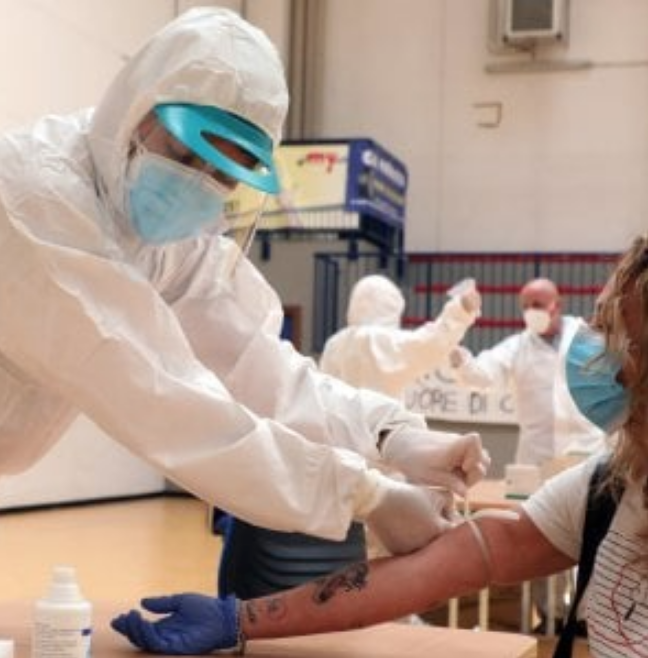Covid-19 & Testing—Tools for Tackling the Pandemic

Residents of Florence and towns throughout Tuscany can now be prescribed free testing for COVID-19 by their family doctors (medico di base).
With the Coronavirus emergency, much confusion exists around testing. Who is eligible for testing, where does one go for a test, and even more complicated, what are the different types of tests?
What are the types of tests for COVID-19?
The pharyngeal swab consists of a swab of the throat to determine if one is currently infected with COVID-19. It involves rubbing the swab against the internal walls of the throat. If the viral load is low, it may be necessary to repeat the examination more than once.
The serological test, on the other hand, consists of a blood sample and aims to detect the presence or absence of antibodies to the virus. If the patient has actually developed antibodies, it would be an indication that the virus has passed through the body. It would act as an alarm light to know if you have been, or are still, infected.
There are two types of antibodies detectable by this test: IgM which indicate that the infection is still in progress or IgG, which retain memory of the virus and indicate that it has been infected. After sampling, in the case of a positive response, the swab would next be carried out.
Who can swab?
Swabs can be performed by ASL (Azienda Sanitaria Locale) teams with a doctor’s request or at a hospital when presenting with one or more symptoms: fever, cough or difficulty breathing.
In Tuscany there have been 13 laboratories processing the swabs since the beginning of February. Three are in the university hospitals of Careggi, Pisa and Siena and also 10 other labs: ISPRO (Institute for the Study, Prevention and Cancer Network), the labs in the provinces of Arezzo, Grosseto, Livorno, Lucca, Massa, Prato and Meyer Hospital, plus one private laboratory.
Menarini Pharmaceuticals has made available a diagnostic kit which gives results in 30 minutes as to the presence of COVID-19 infection. This swab allows immediate diagnosis for triage tents, airports, ports and railway stations.
Who can take the serological test?
Enrico Rossi, the president of the Region of Tuscany, announced screening using serological tests with 500,000 available throughout the region. The first 10,000 tests were donated to Careggi Hospital in Florence with the remaining kits intended for hospitals, public health clinics and the private sector. This plan ensured that doctors, nurses and public health workers had first access to the kits.
Where to have the serological test?
All residents of the municipality of Florence can book online for the rapid serological test through the website of the Florentine startup Cupsolidale.it. The exam, performed by a network of private accredited analysis laboratories, costs €25 and can only be performed by those without symptoms and not in quarantine. All tests will be performed only upon medical request and reservations and payments can only be made online for security reasons. The tests will be carried out by medical personnel, at the times and places given in the booking.
One can request and reserve a Coronavirus swab to test for the illness either at clinic (paying €25) or €55 for a test at home, see info) by accessing the CupSolidale website.
On April 14 President Rossi announced ongoing testing of 140,000 healthcare workers, now augmented by testing of an additional 260,000 essential workers. The region’s law enforcement workers, volunteers, caregivers as well as food distribution workers, postal workers, newsagents and funeral home employees all have access to the testing prior to the general public. He stated, “We are facing the largest mass screening initiative that has ever been faced in Italy, which will allow us to reach 400,000 workers among those most exposed to contagion in order to better protect their health.”
Participating private labs, able to handle at least 10,000 tests daily, promise to process at least 250,000 of the tests.
Here is the list of 61 private laboratories that have reached an agreement with the Region.
In additional promising news, on April 14 it was announced a Covid-19 vaccine will be tested on 550 disease-free volunteers in a British clinic at the end of April, the result of a joint collaboration between the researchers of Advent-Irbm in the Italian city of Pomezia (who had previously developed an effective vaccine for Ebola virus disease) and the Jenner Institute of Oxford University. The hope is that it can be used — initially — to protect doctors, nurses and law enforcement personnel as early as September. (rita kungel)
